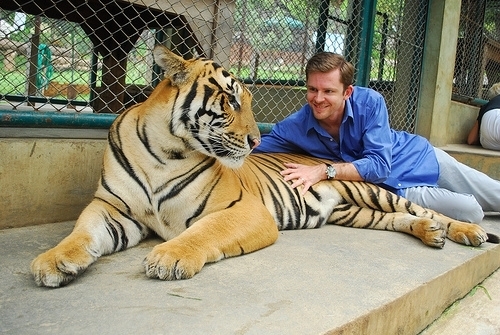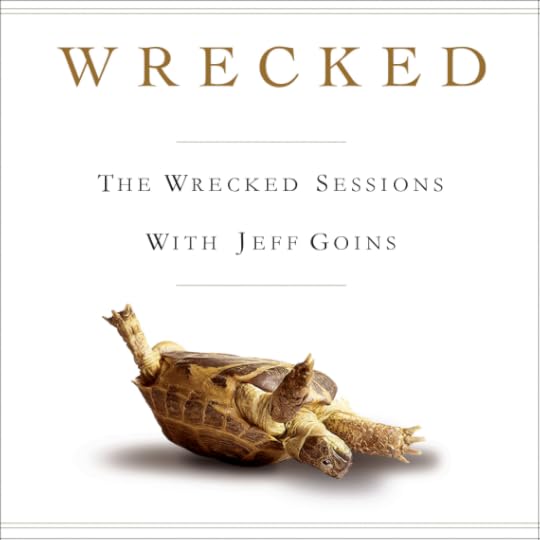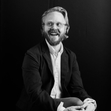Jeff Goins's Blog, page 80
June 3, 2013
The Real Secret to Turning Pro
I’ve written before about how I became a full-time writer and what it takes to get paid for your passion. But if I didn’t tell you the true secret to turning pro, I wouldn’t be doing my job.

Photo Credit: Darwin Bell via Compfight cc
There’s an important truth that few people who’ve “made it” in their industry want to talk about. But in my experience, it’s essential to success.
What is it? Mindset.
Success is first experienced in the mind before it becomes a reality. This may sound kind of metaphysical, but all I mean is: Before you start acting like a pro, you will have to think like a pro. (Click here to tweet that.)
Mindset matters
For me, this meant calling myself a writer, even though I was scared to do so. It meant stepping out in faith, forcing me to rise to the occasion.
And it worked.
Having spoken to numerous professional artists, some of which have reached the peak of success in their fields, I’ve found this to be a universal characteristic for almost every person. Before they succeeded, they had an idea of success and how they would achieve it.
Turns out, what we actually think — about ourselves and our professions — plays an important role in how we act.
The application
So what does this mean for you? Simple: If you are longing to do or be something, you may need to first change the way you think.
As an exercise, why not try something different, possibly scary? Change your mind. Think differently about yourself. This often has a few important outcomes:
You will take the work more seriously. If you want to be a writer, start calling yourself a writer. It will force you to write. But even more than that, it will require you to think like a writer when you actually put pen to paper or lay fingers to keyboard.
Your confidence will grow. You will also learn that the most powerful affirmation is internal. Most of us get praise from friends and family that we don’t accept. But once we start believing something ourselves, confidence tends to skyrocket.
Others will treat you differently. As you begin taking your work more seriously, you tend to do better work. And as your confidence grows and you begin acting more like a pro, the world will have no choice but to start treating you like one.
Of course, there will still be doubters and skeptics, even those who hate you. But that’s okay. There will always be those people. So it’s a good thing you made a decision a long time ago to love the work and believe in yourself, no matter what.
What this doesn’t mean
Real quick: before you pick up those tomatoes, please understand that I’m not saying if you simply believe something, it will happen. That’s absurd. Nor am I saying that you won’t have to work hard, struggle, and hustle to achieve your dreams. You will.
But I am saying the fight begins in your mind. So if you find yourself in a losing battle with the world to claim your dreams, maybe you need to go back to where it all started: in your mind.
Have you always thought negatively of yourself? Been embittered towards those who succeeded? What if you made the decision to change your mind? If all that negativity and cynicism hasn’t worked out for you, then what harm could this cause?
Time to turn pro
This is what it means to be a professional. It’s all it’s ever meant — someone who takes the work seriously enough to do it well and doesn’t look to others for qualification. You are qualified because you believe you are. Or as Steven Pressfield says:
You are when you say you are.
Are you ready to start acting like a pro? To do the work that matters and stop apologizing for the art you owe the world? Then it’s time to start.
You will begin where all pros do: with the mind. By changing the way you think today so you can leave a legacy tomorrow. It may be uncomfortable, even painful. But it will be good.
And you just might be surprised at how much a simple shift in mindset can affect everything.
For more of my story on turning pro, watch this video in which Michael Hyatt interviews me for his Platform University community (to get the full interview, you have to be a member).
What’s your experience been with thinking like a pro? Share in the comments.
You just finished reading The Real Secret to Turning Pro! Consider leaving a comment!

May 31, 2013
How to Create Your Own Freedom, Live an Adventure, & Do Work That Matters: A Chat with Chris Guillebeau
Wherever you look, there are voices telling you to “live a better story” or do something “epic.” They make it sound easy. But it’s not so simple, is it? The truth is the epic life requires more than just blind courage. Few people understand this better than Chris Guillebeau.

This is Chris, doing what he does: taking risks.
Chris is a friend, mentor, and patron to the work I do (he graciously endorsed my book, Wrecked). What impresses me most about Chris is his ability to stay true to his values of generosity and adventurous living while wisely providing for himself so that he can sustain those passions.
So when I had a chance to sit down with Chris and chat about these ideas, I really wanted to know one thing: How do you live a life full of adventurous experiences and creative endeavors without going broke? That’s what we discuss in this interview.
Note: Chris just opened registration for a limited time for his new online entrepreneurship course, Adventure Capital. I’m an affiliate for this course (but also a member). Which means if you check it out and end up joining the community, I get a little cash for diapers (at no extra cost to you).
Below you can listen to the audio version of the interview, read the abridged text version, or download the 7000-word transcript. Your choice. Enjoy!
Listen to the interview
Listen in a new window | Download
Reader’s Digest version
Jeff: So, Chris, you just finished visiting your last country in your trek to visit every country in the world. How does it feel?
Chris: It feels pretty good. I was actually kind of worried about it. This has been an 11-year process. Eleven years unofficially and, then, about five or six years since I’ve had this stated goal I’ve been writing about it. So, it depends on how you count it. But it’s been a long journey.
So, maybe a year or two ago I started just kind of started feeling worried about the end. Like, what am I going to do? This has been my identity and my focus for a long time.
But it was actually really good. I enjoyed it. And I’m glad to have done it. I’m going to keep traveling and going different places, but I’m also glad to move on to something different.
J: What’s interesting about you, Chris, and it’s obvious now that you’ve just talked about visiting every country in the world, is that you have this unique perspective on life — it doesn’t need to be boring. You don’t have to wait until you retire to live the life you want to live. Can you talk a little bit more about that?
C: There are so many more people who are doing interesting, remarkable things now. People are beginning to become aware that there are more possibilities, and more opportunities than perhaps there were before.
We’re able to ask a lot higher-level questions than many of us were previously, like, “What kind of work would we like to do?” “How would we like to spend our free time?”
I don’t feel like I’ve started anything in that regard. If anything, I have this community of people that are doing amazing things.
For me, I just wasn’t good at doing things the normal way. I wasn’t a good employee. When I tried to work for people I just did a terrible job. And I was a juvenile delinquent. I stole cars, which probably isn’t the best career path forward. But that’s how I was when I was 15. Then when I went overseas, and I learned a whole new way of life.
Once you experience things like that, once you begin to travel or you’ve started working for yourself, it’s very hard to go back. Once you have an initial amount of success or something that’s new or different, you just want to explore it more. You just want to see where it can go.
So I always encourage people to just do whatever you can to have that moment of inspiration or discovery. And I think that will lead to more opportunities later.
J: If we want to live a more interesting life, do we have to do scary things like travel the world?
C: Do we have to do scary things? Well, I don’t know. I don’t think anyone has to travel the world, of course not. Not everyone wants to travel the world, and that’s fine.
But I do think we should do things that stretch us and challenge us. For a long time I wanted to be a writer instead of actually being a writer and just sitting down and doing it. I had to overcome that.
It’s important for all of us to think about, “OK, what do we really want for ourselves?” What do we want for ourselves? What do we really want to do, or become, or achieve? And how can we structure our life in a way that allows us to get closer to that?
And, then, what I always encourage people to think about is, “OK, so you’ve got this amazing life, or at least you’ve got a pathway to an amazing life, what’s next? What are you contributing? What are you doing for others?”
Because that’s the other missing link. And everyone should think about that.
J: I see you living a creative life. What motivates some of the decisions that don’t make sense? For example, having an event and then giving away $100,000 to the attendees. That doesn’t make sense. You’re doing some things in your life that get people talking and get people thinking differently. Why?
C: Because it’s exciting. Because it’s fun. And I think all of us have to pay attention to what makes us excited, right?
You mentioned the thing that we did last year at the conference where we invested $100,000 directly back into the lives of all the attendees. When I first thought about that, I thought, “This is a crazy, ridiculous idea.” And it sound so exciting. It will be so fun. It would be so fun and so meaningful.
If you give 1,000 people $100 each, probably not all of them are going to go and do something great with it. Some of them will just go out to dinner, and that’s fine. But probably some of them will do something interesting. They probably will do things that we haven’t thought of.
I’m writing a new book about quests right now. And I’m talking to all these people who have done crazy things. There is a guy who walked for 17 years without using a car. Other people have circumnavigated the globe. There’s all kinds of different stuff. And they all say the same kind of thing:
It was difficult. And it was challenging. It was crazy, but that’s why I did it.
I’m motivated by things that I find to be fun and enjoyable. And I hope other people enjoy them, too. But if not, at least I know that I will.
J: How do you balance risk-taking with responsibilities?
C: Experience produces confidence. The more you do these kinds of things, the more your vision expands. The more you do things, the more confidence you have.
I have a lot of business projects now. I’m not super wealthy, but my business does well. I’m a successful author. I have products that sell. I have good passive income. Since I built this over a number of years, it does allow me to take more risks.
But for anyone who doesn’t have that, you can still take risk. You can still start with what you have. And everybody has the ability to contribute to something.
J: What got you started as an entrepreneur?
C: What got me started was initially a motivation to do anything I possibly could to not work for someone else. This was age 19.
I wasn’t like trying to change the world or anything. I delivered pizzas. I had worked at FedEx in the middle of the night hauling boxes in Memphis, Tennessee. And these jobs do not offer a lot of advancement potential. They were not high-paying jobs. And, so, initially I was just like, “How can I do something?”
So that’s how I started learning about working online which is like now 13 years ago when people were just starting to do this and buying and selling different things, and learning about website design and all this different stuff.
The initial motivation was freedom and independence. I want to be on my own. I was a jazz musician and loved playing music. But music doesn’t pay that well; at least it didn’t for me at the time.
So, initially it was just, “How can I create something that can support a lifestyle that I hoped to have?”
J: In your best-selling book, The $100 Start Up, you emphasize the ease it takes to start a business. Now, there is very little risk. Obviously, it takes a lot of work, but it can be easy to start. Explain this more.
C: We did a two-year study of about 1500 people. And from all over the world, all different walks of life, men and women, different ages. That was the best part of the whole experience of writing and publishing the book.
This is a movement. People are really creating their own freedom in a very easy way. As you said, it takes a lot of work to run a business, of course. But the point is the costs have greatly lowered. Access to information is lowered.
J: So, if it’s easy to start, why don’t more people do it?
C: Well, I think a lot of people are doing it. It’s becoming much more common. I don’t think it’s mainstream yet. But I do think it’s becoming more common to meet people not just in urban centers, or cities where change happens, but all over the place that are doing it.
As to why more don’t, I really do believe that probably the biggest obstacles in anything like that are more internal than external. The biggest obstacles are we all have our own fears, and our own insecurities, our own anxieties. I think we’re just busy with other stuff. We haven’t prioritized.
So we are all at fault for wanting to do things but not creating an environment around us that allows us to do those things. One of the things I try to do is encourage people to start, and to start with where they are, with what they have. And, then, seeing where things go from there.
J: You’ve got a great course about that addresses this, aptly named “Adventure Capital.” But could you give maybe a few practical tips from it?
C: I think we like to make starting a small business very complicated. Or maybe that’s what we’ve always heard. However, a business is just three things:
It’s a product or a service.
It’s a group of people interested in that product or service.
It’s a means of getting paid.
I encourage people to focus on only those three things in the beginning.
If you’re not sure what area to focus on, ask yourself what people ask you about. Then do whatever you can do to get the website up, or if it’s an offline thing, however you’re going to put that offer out to the world. I would encourage you to do that as quickly as possible.
What I hear over and over is that whenever people got their first sale, they found that very empowering. Even if they sold something for $10, they talked about how excited they felt. Because all of a sudden they’re making income from a source that’s different from their employer. And that was the beginning for a lot of people to then go on and grow their business much more.
But they didn’t wait six months. They didn’t wait a year. They didn’t write a business plan that no one else would ever read. They got started as quickly as possible.
Download the transcript
If you want the full text version of this interview, click here to download the free PDF (thanks to Eva P. Scott for her wonderful transcription wizardry!).
* * *
To find out more about Chris and his writing, check out his excellent website.
If you want some in-depth help building or growing a business, check out Chris’s new course, Adventure Capital (affiliate link). Registration is only open for the next week, so hurry up if you’re interested. Click here to find out more about it.
Have you ever considered the kind of life you want to live? What would it take for you to live it? Share in the comments.
You just finished reading How to Create Your Own Freedom, Live an Adventure, & Do Work That Matters: A Chat with Chris Guillebeau! Consider leaving a comment!

May 28, 2013
Does This Make You Mad? (Why What Others Are Doing Isn’t Working for You)
Ever seen someone succeed at something and then try it yourself — only to utterly fail? Doesn’t that make you mad? What was so different from what you did? Why did they see success, and you didn’t? Maybe you failed to ask one important, but often overlooked, question.
[image error]
Photo Credit: bitzcelt via Compfight cc
Two years ago, I got serious about leaving a job I absolutely hated in pursuit of becoming a full-time writer.
For the first year, I messed around, not taking the work seriously enough. I self-published a book that completely flopped, selling five copies in the first three months — and those were to friends.
After this disaster, I thought about not ever using the Internet or social media again. I was done.
After two weeks of crying myself to sleep, I got back online and decided to figure out what went wrong. After much research, and some strategic planning I was able to crack the code. I realized what I’d been doing wrong and quickly corrected the problem.
Then, I put a plan into practice to ensure success, and in no time, both of my self-published books were a success, selling over 80,000 copies. They did so well, in fact, that I was able to get a book deal with a major publisher without an agent or submitting a book proposal.
And it all had to do with one question I wasn’t answering.
What you do isn’t as important as why you do it
Two years ago I ran across the story of Amanda Hocking and was completely inspired by her success in self-publishing. I thought if Amanda could sell over a million ebooks, then I could probably sell at least 10,000.
That would give me more then enough income to quit my job and live out my dream of writing. So I studied the game plan Amanda used and copied it. I figured if it worked for her, why wouldn’t it work for me?
But I was wrong. I fell on my face when I tried to do what someone else had done. And here’s the reason:
I failed because I couldn’t answer the “why” of what I was doing.
After that initial failure, I looked at my plan and thought about the “why” of every part. If I couldn’t answer why I would do a certain something, I cut it.
And guess what? I started to succeed where I had failed before. All because I understood the reason behind the strategy.
Where most people miss the mark
Lots of people ask me about using the Kindle Select Free promotion, a strategy I’ve implemented with some success. And I always ask why they want to use it.
Most of the time, they want to do it because somebody told them they should. They heard it’s something you do to get the word out about your book, and that sounds pretty good.
The problem? There’s no strategy behind why they want to use it. They don’t have a plan. And here’s the truth: Exposure for exposure’s sake isn’t worth much.
Using the KDP Select program, I did a free promotion for five days and my ebook was download over 15,000 times. Which is great, but if I left it at that, I wouldn’t have benefited much from those downloads.
This is where most people miss the mark. They do a promotion for the exposure but don’t have a plan for what comes next.
The ebook I gave away was a manifesto I created to release two weeks before my second self-published book came out. In the back of the manifesto was an ad for the second book.
Those who read the manifesto and liked it got a chance to buy my next book, which they didn’t have to wait long for. That’s how I answered my “why” for the free promotion. It wasn’t about the manifesto; it was about what came next.
The million-dollar question: Who are you trying to reach?
The reason most writers fail is they don’t know who they’re talking to. They don’t know their target audience. So they do what most of us do when we aren’t sure of ourselves: they over-communicate.
Out of fear, we say too many things instead of focusing on what we should say, what will get results. We don’t know what will work, so we just run our mouths, which only further confuses our audience.
In any message you communicate, you have to know who you’re talking to, what will get through to them, and why you’re talking to them in the first place.
In addition, asking what you want people to take away from your message will help narrow your focus and define the audience. The more someone takes away from your message, the more they will help it spread. And that’s the ultimate goal in sharing anything: getting others to spread the word for you.
As Chris Brogan says:
Be yourself, not the echo of someone else.
Which brings us back to imitation. People want to read your blog and listen to your podcast and buy your book to hear your voice, not someone else’s.
So, please take advantage of this wonderful Information Age and use all that great content you read everyday. See the strategy behind it, but understand that the implementation has to be uniquely yours. And you can make it yours by asking one simple question.
How has asking “why?” prevented you from failure? How could it have? Share in the comments.
You just finished reading Does This Make You Mad? (Why What Others Are Doing Isn't Working for You)! Consider leaving a comment!

May 23, 2013
How I Started Getting Paid for My Passion
People often ask how I made the transition from full-time employee to full-time writer. Some want to know the specific steps I took to get paid for my passion, while others are interested in how I manage to make a living writing books and blog posts.
But here’s the truth…
I never intended to make money doing this. I didn’t think it was possible. But that doesn’t mean any of it “just happened.”

Photo Credit: cafemama via Compfight cc
When I started this blog, I thought at most I’d be able to publish some books (if I was lucky) and collect a few meager royalties. All while holding down a day job for the rest of my life.
In less than two years, though, I found myself at a crossroads. My blog (which accounted for less than 10 hours per week) was now contributing more income than my full-time job (which took up at least 40 hours per week).
Within three months, I had not only replaced my wife’s salary, I had surpassed both of them combined. It was mind-blowing and meant that I had to make a decision.
Making the “leap”
This put us in a strange position. I wondered,
Should I keep my job and play it safe or make the leap into full-time self-employment?
I liked my job, but I’d felt for a while that it was time to move on. At the same time, my family was relying on me now. Was my dream worth the risk?
After some discussion and prayer, my wife and I concluded the success of my side gig was God’s way of saying it was time to jump. So that’s just what we did.
In a matter of just a few months, my wife and I went from two steady incomes to no steady incomes and a job description that was hard to describe (“Well, you see, he writes for a website and sells stuff that you can’t hold in your hands… and no, we’re not living in a cardboard box.”).
When people hear this story, they often tell me how “risky” it sounds. The truth is it felt a lot more like building a bridge than leaping across a giant chasm. And the reason for that lies in how I made the transition to full-time self-employment.
I did it gradually. Perhaps, not as slowly as some, but certainly not as quickly, either. Two years is a long time to wait when you feel a strong tugging at your heart.
So when transition time came, there was a lot of security (both financially and emotionally) in that decision. We knew we would be okay. Because this was something I built gradually over time, the “leap” of faith felt more like taking the next step.
The practical parts (how I actually did it)
So that’s how I made the “leap,” but how did I even get to that point? How did I start getting paid for my passion in the first place? Great question. Here’s what I did (and I’m sharing this because I get asked this question at least a few times per week):
I built the audience first. I’d heard stories of people like Brian Clark who built their audiences long before they tried to sell , and I thought that sounded smart. For more than a year, I wrote a LOT of free, helpful content (i.e. eBooks, newsletters, blog posts, guest posts, webinars, and more) and shared it with my audience. The result was a tremendous amount of trust — to the point that people started begging me to sell them something.
I asked my audience what they wanted. Sean Platt told me to do this, recommending a survey to ask people what they’d buy from me, even how much I should charge them. Over 1000 people responded, many indicating (to my utter shock) they would indeed pay for something I created. That gave me the confidence to try something.
I experimented with an initial offering. My first product was a $2.99 eBook (which I seriously doubted people would buy). Based on the concept of a minimum viable product, I put together an offering that required minimal effort to create and then put it out there to see if people would buy it. The money I made from the first weekend it was released paid for my email marketing service for an entire year (about $1500). After that, everything changed. A hobby became a business.
I learned how to launch things. After that first eBook, I released another eBook but with three different price points (based on Chris Guillebeau’s advice) and a few other tweaks. This generate ten times the sales that the first product did — in a matter of a few weeks. It also taught me how to harness the power of an online product launch (which I’ve since used on my book and online course). Learning how to launch was the golden nugget I was missing that led to sustainable, repeatable success in my business.
Dreams don’t just happen
It’s worth repeating: I didn’t plan for any of this to happen. But that doesn’t mean it was an accident. I saw an opportunity and took it. Which may be the biggest takeaway from the past two years.
Some of our biggest successes can’t be planned, but they can be anticipated. [Tweet that]
This means if you want to do something similar, you will need to be patient but also vigilant, paying attention to the opportunities that come. And when the right one presents itself, be ready to take it. You won’t be able to plan for it, but you will be able to recognize it (if you know what to look for).
Until then, the best course of action is to be generous and build trust like there’s no tomorrow.
Free online workshop: If you’re interested in learning more about this, I’m hosting a webinar with career coach Jonathan Mead, who has helped more than 500 people (including me) make the transition into doing what they love for a living. Click here to register (it’s free, but seats are limited).
Have you ever gotten paid to do what you love? What did you learn? If not, what would you do? Share in the comments.
You just finished reading How I Started Getting Paid for My Passion! Consider leaving a comment!

May 21, 2013
The Problem with “Fake It Till You Make It”
In the world of social media, we are constantly in front of other people. There’s a lot of pressure to always be “on,” which breeds a pressure to perform. In response to this, a “fake it till you make it” gospel has formed.

Photo Credit: Johnatron via Compfight cc
I get the sentiment. Sometimes if we don’t “fake it” we’ll never have the confidence to create anything. But this message is incomplete and has some dangers to it. If we aren’t careful, adopting this gospel can hurt us and even our messages.
You can’t fake it and be yourself
We all project an image of ourselves to the world. This image is generally made up of half-truths, qualities we value and want to be true but sometimes aren’t. Or at least, they aren’t always fully developed yet.
For a long time I wanted people to think I was a professional blogger, and I was, but I wasn’t painting the whole picture. I talked about my work but didn’t include the less attractive parts of my lifestyle, like how I was living on a futon in a friend’s spare bedroom.
My not telling the whole truth made it more difficult for my audience to connect with me. What they were connecting with wasn’t really me; it was the persona I was projecting.
Real connection happens when — and only when — you’re completely honest. [Tweet that]
The real me would have been more relatable than the “me” I was projecting. In this case, my fake-it-until-you-make-it attitude was self-defeating. Faking it made me lose sight of two important parts of my writing:
First, I lost sight of my message
In some seasons of life, I’ve been so focused on people seeing me a certain way that I’ve lost sight of my message.
There was a time when I was no longer writing what was true to my message. Instead, I focused my writing on what I thought others wanted me to say. And my message got lost.
This happens to a lot of us, especially in the world of social media. We’re constantly in front of people, so we often feel the need to put on a show. And in so doing, we tend to hide the weaker parts of our personality, the parts we assume nobody wants to see.
The irony is our weaknesses are what make our messages believable, because they are what make us as storytellers and communicators relatable and reliable.
Then, I lost sight of the craft
Part of being a good writer is being a good write-er.
Honing your craft, developing your skill — these things don’t come easily. If you’re focused on faking it until you make it, you’re using time and energy for that, and have less real estate for learning and growth.
Part of being a good writer (or a good anything for that matter) is continually humbling yourself to become better at what you do.
In college, I was really intentional about developing my writing skills. I’d just started blogging, and the resources were there, so I took advantage of them. I took electives in writing that forced me to write everyday, to share my work with others, and to read good writing.
After college, I guess I assumed my season of learning was over. Having checked “learning how to write” off my list, now I could move on to bigger and better things like building a platform.
I stopped writing everyday, stopping reading resources, stopped getting my work critiqued, and eventually saw how it negatively affected my craft.
And here’s what I learned…
If you can’t write, you can’t share a message — even if it’s a good one! And if you don’t hone your craft, your message will fall on deaf ears.
Eventually, though, I got back on track. But it took a long time to find my message again and refocus on the craft of writing. And if there’s something I’ve learned from this journey with blogging, it’s this:
Don’t lose your message because you’re concerned with developing a persona.
The world needs what you have to say, but only if you can get over yourself — and your need to be recognized — and just say it. So please get started sharing your message with the world. But whatever you do, don’t fake it.
This week only: Darrell’s new book, UNBLOGGER, is free until Friday, May 24. You can download it from his website or go grab it on Amazon. Be sure to tell your friends!
What do you think the balance is between being honest and faking it until you make it? Share in the comments.
You just finished reading The Problem with "Fake It Till You Make It"! Consider leaving a comment!

May 18, 2013
The True Nature of Compassion [Podcast]
Have you ever had an experience where you tried to do something good for someone else but ended up feeling worse? Ever felt empathy towards someone in such a way that it hurt? Maybe that’s not such a bad thing.
True compassion doesn’t leave you feeling warm and fuzzy. True compassion breaks your heart and leaves you feeling helpless. And the reason for this is because true compassion requires you to step outside of yourself.
This week, we return to Wrecked Sessions (a limited-time podcast I’m doing to continue conversation around my book, Wrecked). In this episode, we interview my friend and colleague Talia Bunting and talk about how messy helping others can be.
Listen to the podcast
Subscribe in iTunes | Listen in a new window | Download
About our guest
Talia and I worked together for a number of years at Adventures in Missions, but we originally met on a mission trip to Mexico many years ago. Together on that trip, we experienced a “wrecked” moment when we met a homeless woman on the streets of Palenque, Mexico.
This woman was clearly mentally disabled — she kept talking about her mustache and couldn’t remember her name. We tried to offer her water and bread, but she wouldn’t take any of it. We prayed for it and walked away. And as we did, our hearts broke.
Only a few steps away from the Nameless Woman, Talia broke down and started crying, saying, “I feel so helpless!”
In this episode, we explore with our guest the pain we all feel when we have to walk away from a need we aren’t able to meet — and how sometimes, that’s just the beginning of the story.
Show highlights
In this podcast, we talk about:
Why doing good often feels bad
The stupidity of the cliche, “plant a seed”
When we feel helpless to do anything for someone else (and what to do about it)
The messiness of ministry and how sometimes our only choice is to walk away from needs
How our guest learned more about compassion by working in a bar than she ever did in the mission field
Get involved
If you liked this podcast, here are some other ways to get involved:
Listen to last week’s session.
Leave a review on iTunes.
Buy the book on Amazon or Barnes and Noble.
Grab the free action guide and get a group to go through the workbook together.
Join me in Raleigh in August for this event (limited seats available!).
Get a free copy of the Wrecked Manifesto (plus some other goodies) when you join my exclusive newsletter list.
Have you ever experience true compassion? Have you ever felt helpless to meet someone else’s needs? Share your story in the comments.
You just finished reading The True Nature of Compassion [Podcast]! Consider leaving a comment!

May 16, 2013
If You Could Do Anything for a Living, What Would You Do?
They say that the answer to the “If you could do anything…” question tells you what you’re meant to do. It says something about your passions and interests and what you’d be doing if you didn’t have to worry about paying the bills and such. But most people struggle with the two — I call it the issue of vocation versus occupation.

Photo Credit: Adam Foster | Codefor via Compfight cc
The word “vocation” comes from the Latin vocare, which means “calling.” It suggests some grand purpose in your life. Occupation has the same root as “occupy” and that’s just what it does — occupies your time and brings home a paycheck.
A few years ago, I was struggling with this tension between passion and provision.
I sensed my heart was directing me to live with reckless abandon in pursuit of my dreams, while my mind was telling me to be more responsible and stable in preparation for marriage.
Worried about the crossroads in life I was facing, I was anxious about “selling out” and living a mediocre existence. In a panic, I called my mentor.
I can’t stress enough how important it is for young people to have mentors in their lives that they trust to give candid feedback. I’m not just talking about a parent, professor, or pastor, but someone who speaks into your life even when you don’t ask. This takes a high degree of trust and grace to build, but once you have the relationship, it’s invaluable.
So I went to my mentor and told him my dilemma.
Candidly, he responded, “Join the crowd.”
“What?!” I was incredulous.
“Actually,” he said. “I think you’re in a good place — struggling with what you could do and what you should do. It says a lot about your character, that you’re concerned about fulfilling your life’s calling and providing for your family. I feel bad for those don’t struggle with the two.”
I ruminated on that for awhile, and it really struck me as profound. Join the crowd.
That phrase changed the way I thought of what I had to do and what I loved doing. I had always believed that if those two didn’t completely synchronize with one another that something was seriously wrong in my life.
But maybe that’s just how real life is — messy.
Maybe there is nothing wrong with struggling with the tension between occupation and vocation. Maybe the real tragedy is in not struggling at all — in flaking out on your responsibilities for the sake of your “calling” or compromising your dream for the sake of security.
Maybe those of us who don’t lose sleep over the idea of calling and living responsibly are indeed missing out.
Maybe you should join the crowd.
What would you do… if you could do anything? Share in the comments.
You just finished reading If You Could Do Anything for a Living, What Would You Do?! Consider leaving a comment!

May 9, 2013
When the Adventure Ends (And Real Life Begins) [Podcast]
It’s natural to want to go on an adventure. To leave home for college. To move to a new city where no one knows your name. To take off and see the world.
But what happens when the adventure is over — when the vacation ends, when they hand you your diploma, when you finally decide to plant some roots — and the struggle of real life begins?
That is when we learn what we’re made of. And that is what my friend Matt Snyder learned after 11 months of touring the world and had to get an ordinary, boring job that taught him some unexpected lessons.
This week on the Wrecked Sessions, we hear from a world traveler who learned that sometimes the point of our restlessness is to learn how to stay put.
Listen to the podcast
Subscribe in iTunes | Listen in a new window | Download
About our guest
I met Matt at a missionary training camp when I worked for Adventures in Missions. We were both writers and formed a friendship around that common bond.
Shortly after we met, Matt left on a year-long trek around the world called The World Race. During his trip, he blogged quite a bit and caught my attention as someone who knew how to tell a story.
When he returned from his trip, I hired Matt as a copywriter to be a part of the marketing team that I led at the time. But it didn’t take long for him to be home before he started feeling restless again.
After several heated discussions about responsibility and work, I decided to issue a challenge to Matt. One that I knew he needed (but didn’t want) to hear.
Get involved
If you liked this podcast, here are some other ways to get involved:
Listen to last week’s session.
Leave a review on iTunes.
Buy the book on Amazon or Barnes and Noble (either for you or a friend)
Download the totally free Wrecked Action Guide; get a group to go through the workbook together!
Join me in Raleigh in August for this cool event sponsored by Help One Now.
Get a free copy of the Wrecked Manifesto (plus some other goodies) when you join my exclusive newsletter list.
Have you ever had a tough conversation with someone that you needed to have? Share in the comments.
You just finished reading When the Adventure Ends (And Real Life Begins) [Podcast]! Consider leaving a comment!

May 6, 2013
Launching a Blog Is Easier Than You Think
Almost every week I meet someone who tells me they’d like to start a blog… some day. The problem is that “some day” never comes.

Photo Credit: BKHagar *Kim* via Compfight cc
And most people are okay with that. Because blogging is hard, real hard. And they’d rather not get into all that hustle and hard work. Which is fine (I don’t blame ‘em).
But blogging can also be extremely rewarding. And some people who aren’t doing it need to be doing it. They need to share their words with the world; they need to be picking themselves and publishing their words now.
So let’s say you’re one of those people. One who’s been saying you’d like to start a blog. And you actually mean it. And let’s say you have a message to share with the world.
What’s holding you back?
There are three common excuses I most often hear from people who don’t blog (but would like to):
“I don’t understand the technology.”
“I don’t have the time.”
“I’m afraid to start.”
All are valid excuses, but the first two are usually just masking the third. Fear. That’s what’s holding you back. Plain and simple.
Sure, there may be technical aspects that get in the way of you beginning, but if you really wanted to figure it out, couldn’t you? Of course you could.
The truth is it’s easier to let an excuse prevent you from sharing your work than it is to find a way to put it out there.
The most important reason to blog
The reality, though, is that this isn’t just about you and your comfort zone. If you have a message in you that you needs to come out, we need those words.
Because if you don’t say it, maybe no one will. [Tweet that]
That’s why we blog, why we write and publish — even when we don’t feel like it. It’s why we share our art and put it on display for all to see. We hope to reach someone.
Right?
So maybe this choice to write isn’t entirely up to you. Maybe you need to consider the cost of depriving the world of your words. Maybe it’s time to start blogging.
How to begin
Really, it’s not that hard. All you need to start blogging are three characteristics:
The ability to learn new things.
The willingness to try and fail (as many times as it takes).
Courage to write and share your words with the world.
When you boil it down, those aren’t really characteristics. They’re choices. So what are you going to decide?
Decide to blog, or to not. But please, stop saying you’d like to some day, if only you have the time. That excuse is getting old. What you really need isn’t a roadmap; you need to decide.
Once you do that, it’s pretty simple:
Get a host. I recommend BlueHost (that’s an affiliate link which means if you use it, I get a commission, but remember I don’t recommend anything I don’t use myself and love).
Buy a domain (you can do this through your hosting company, which is easiest).
Install WordPress (Bluehost does this automatically for you with one click).
Start writing! (This may be the hardest part.)
No more excuses
I don’t think everyone should blog. It takes a lot of time and effort, and for some it may not be worth the hassle. But if you’re one of those people who says, “Some day…” I hope I just left you without any more excuses.
Because you don’t have any. The answers are out there, waiting for you. You just have to be willing to look.
(Btw, Below is an eight-minute walk-through to get you set up with your very own self-hosted blog.)
Free resource: If you’re still feeling held back, I’ve got something for you. Here’s A Step-by-Step Guide to Launching Your Own Blog. You’re welcome.
Now, go do something. We’re waiting for your words. Oh, and if you already have a blog, tell me about it below.
So what’s holding you back from sharing your words with the world (regardless of whether or not you have a blog)? Share in the comments.
You just finished reading Launching a Blog Is Easier Than You Think! Consider leaving a comment!

May 2, 2013
Breaking Out of Your Comfort Zone: When a Nonfiction Author Writes Fiction
I’ve written 14 books to date. But my most recent book was a brand-new venture for me. Honestly, it felt a little risky.

Photo Credit: Amir Kuckovic via Compfight cc
This new book isn’t fiction. Not exactly. Neither is it non-fiction. In fact, it’s a hybrid of the two, combining fictional elements with non-fiction teaching.
And to be honest: this kind of writing was a first for me.
Where fiction meets nonfiction
Unlike fiction, my new book stays very close to the historical and sociological setting of the day in which it takes place. In addition, it includes a nonfiction part where practical principles for living are drawn from the story.
In many respects, this was a difficult book to write. But during the writing process, I found four ingredients that helped me finish the project. And I’d like to pass them on to you.
Whether you write fiction or nonfiction (or you’re a “switch hitter” and write both), I think you’ll find these ingredients and their lessons to be beneficial in your own writing journey.
Get help from a seasoned writer
This is essential. Because fiction is not my forte, I consulted with two seasoned fiction writers for help. One a male, the other female.
Melissa Norris is an excellent fiction writer with a vivid imagination. She gave me some great tips and on how to capture the scenery throughout the narrative.
Eric Wilson, the New York Times Bestselling author of Fireproof, Facing the Giants, and October Baby has been writing fiction since he was in diapers. Eric helped me learn how to think like a fiction author. He gave me many superb suggestions that I never would have come up with on my own.
Without the help of experts, I wouldn’t have grown as I did through this project and been confident enough to publish the book.
Ask a scholar
What I don’t like about typical Christian fiction (the genre in which I was writing) is there’s so much added to it that it often butchers history and confuses the original text with too much imagination.
In writing biblical narrative, I tried to stay true to the text and remain faithful to history. But I couldn’t do that on my own (I’m not a scholar).
For that reason, I asked two scholars and historians to read the book and give me their critical feedback. They were Craig Keener and Joel B. Green, and their feedback was tremendously helpful. They took my book from a good story to an accurate account of history.
Apply what you’ve learned and share
What makes good fiction is showing, not telling. You show the reader what’s going on instead of telling them. Hemingway was a master at this.
For example, instead of saying, “Joe was tall,” you would say something like, “Joe had to duck to get through the door.” Simple, right? Not exactly.
I’ll be the first to admit that I find this type of writing incredibly difficult. I suspect that it comes natural to great fiction writers, but maybe they struggle with it, too.
Despite the difficulty, though, I did a lot of this in my book — only because I had a little help from my friends — early readers who were kind enough to read the book and tell me where the storytelling was working (and where it wasn’t).
Seek the right endorsements
If you’re moving into a new genre, you need to establish yourself as a credible voice in it. One great way to do this is to ask authors who are already authorities in that genre. They can help you establish trust and earn permission to speak to a new audience.
Mary DeMuth, Eric Wilson, and Melissa Norris are just some of the fiction writers who wrote wonderful recommendations for my book. And I was incredibly grateful for their help.
Endorsements are a great way to get in front of new readers and establish yourself as a new voice in a new genre. In total, 47 people endorsed my new book (you can see what they said here), which was great. Others’ belief in me and this project spurred me, giving me faith that this was a story the world needed to hear.
I’m sure more ingredients can be added, but these are the top four that I discovered during this project.
Note: If you buy Frank’s new book before May 7, you’ll be eligible for 25 free gifts from 15 different authors (including me). All you have to do is grab a copy of God’s Favorite Place (Amazon affiliate link) this week and email your receipt to godsfavoriteplace@gmail.com, saying where you bought it.
Have you ever jumped genres? What other tips would you add to the list? Share in the comments.
You just finished reading Breaking Out of Your Comfort Zone: When a Nonfiction Author Writes Fiction! Consider leaving a comment!





